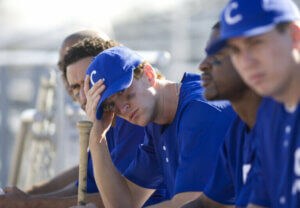Is It Good to Criticize Yourself?

Every athlete has to self-criticize at some point. When you lose a game that seemed easy or you doubt your performance, coaches and players always think it’s best to criticize yourself as the first step to change.
Specifically, it’s an exercise in reflection on the behavior that occurred in a certain situation. You can do this alone or with the team, with the aim of trying to understand what went wrong and how you can do it better in the future.
In fact, the ability to criticize yourself is one of the most important characteristics among athletes. If an athlete feels proud after a painful defeat, he looks bad. Also, this can lead to problems with his environment or even with the press.
At first glance, self-criticism can be a positive quality. However, it can be a huge burden for athletes. Next, we’ll assess how this quality influences you and how you can use it to your benefit.
Can it be good to criticize yourself?
Generally speaking, it’s not bad to examine behaviors later on to improve. On the other hand, there’s a time and place to criticize yourself. If you do it at the wrong time and without taking certain things into account, this exercise does more harm than good.
For example, it’s not good for a coach to do it in the post-game talk, right after losing an important game. Trying to find explanations for what happened when emotions are intense can be harmful. In fact, negative emotions prevent you from thinking clearly and processing what happened.
On the other hand, self-criticism also becomes problematic when the athlete resorts to it excessively, especially to blame themselves for situations that are beyond their control. For example, after suffering an accident that ends in injury, blaming yourself doesn’t contribute anything because it’s an unpredictable situation that can happen to anyone.
Also, there are academic publications that highlight that self-criticism is a powerful tool, capable of contributing positive things. For example, it can start a process of change, but it can also cause discomfort and negative emotions.

How to positively criticize yourself
As we said in the previous section, there’s a time and place for self-criticism to be beneficial for an athlete or team. Let’s look at some of them in detail:
1. Criticize behaviors, not people
One of the fundamental principles to keep in mind is that you question the behaviors, not the people. You have to know how to separate what the person is and their behavior and focus on just analyzing the latter. At the end of the day, you want to change your actions.
Another reason not to carry out any personal attacks is that you have to keep in mind that making mistakes is an inseparable part of humans. We all make mistakes at some point in our lives, and pointing out the person is not an effective way to solve them.
2. What you say is as important as how you say it
Doing a self-criticism exercise requires good communication skills, especially when done in a group. Nobody likes to be told that he’s failed or that he didn’t perform as well as he should have. Therefore, it’s important to not only choose your words carefully but also to pay attention to the tone and gestures you use.
There are many ways to criticize someone else’s behavior with respect. One of them is known as the sandwich technique, which consists of saying something positive about the person, then saying what should change and ending with another positive aspect. In fact, it’s a way to soften criticism and acknowledge that you also have positive qualities.
3. Focus on things that are under your control
It’s very common for athletes, especially those who are perfectionists, to try to blame themselves or feel responsible for things that aren’t under their control. You should only criticize yourself for things you’re responsible for or for situations that happened directly because of your actions.
Also, keep in mind that accidents happen and there’s no reason to explain them. In addition, focusing on uncontrollable things is a source of distraction that prevents the athlete from focusing their resources on personal change.

4. Look for the positives too
Many times, we tend to focus on the negatives after a difficult moment, when the truth is that you can always get positive aspects from any situation. Looking for the positive in unpleasant situations helps to relativize what happened.
It’s also a way to protect your self-esteem and prevent mistakes from negatively affecting your confidence. Even after making mistakes, athletes shouldn’t doubt their abilities and resources.
Make self-criticism your ally for change
Carrying out a self-criticism exercise can be beneficial, and sometimes necessary, in order to avoid future mistakes and improve performance. However, it requires special care because it can easily be misinterpreted and become a personal attack.
Finally, keep in mind that confronting other people is detrimental to the group. Therefore, it’s better to find a calm moment and a pleasant place to criticize yourself. Also, it’s better to let a few days pass than to do it when emotions are running high.
Every athlete has to self-criticize at some point. When you lose a game that seemed easy or you doubt your performance, coaches and players always think it’s best to criticize yourself as the first step to change.
Specifically, it’s an exercise in reflection on the behavior that occurred in a certain situation. You can do this alone or with the team, with the aim of trying to understand what went wrong and how you can do it better in the future.
In fact, the ability to criticize yourself is one of the most important characteristics among athletes. If an athlete feels proud after a painful defeat, he looks bad. Also, this can lead to problems with his environment or even with the press.
At first glance, self-criticism can be a positive quality. However, it can be a huge burden for athletes. Next, we’ll assess how this quality influences you and how you can use it to your benefit.
Can it be good to criticize yourself?
Generally speaking, it’s not bad to examine behaviors later on to improve. On the other hand, there’s a time and place to criticize yourself. If you do it at the wrong time and without taking certain things into account, this exercise does more harm than good.
For example, it’s not good for a coach to do it in the post-game talk, right after losing an important game. Trying to find explanations for what happened when emotions are intense can be harmful. In fact, negative emotions prevent you from thinking clearly and processing what happened.
On the other hand, self-criticism also becomes problematic when the athlete resorts to it excessively, especially to blame themselves for situations that are beyond their control. For example, after suffering an accident that ends in injury, blaming yourself doesn’t contribute anything because it’s an unpredictable situation that can happen to anyone.
Also, there are academic publications that highlight that self-criticism is a powerful tool, capable of contributing positive things. For example, it can start a process of change, but it can also cause discomfort and negative emotions.

How to positively criticize yourself
As we said in the previous section, there’s a time and place for self-criticism to be beneficial for an athlete or team. Let’s look at some of them in detail:
1. Criticize behaviors, not people
One of the fundamental principles to keep in mind is that you question the behaviors, not the people. You have to know how to separate what the person is and their behavior and focus on just analyzing the latter. At the end of the day, you want to change your actions.
Another reason not to carry out any personal attacks is that you have to keep in mind that making mistakes is an inseparable part of humans. We all make mistakes at some point in our lives, and pointing out the person is not an effective way to solve them.
2. What you say is as important as how you say it
Doing a self-criticism exercise requires good communication skills, especially when done in a group. Nobody likes to be told that he’s failed or that he didn’t perform as well as he should have. Therefore, it’s important to not only choose your words carefully but also to pay attention to the tone and gestures you use.
There are many ways to criticize someone else’s behavior with respect. One of them is known as the sandwich technique, which consists of saying something positive about the person, then saying what should change and ending with another positive aspect. In fact, it’s a way to soften criticism and acknowledge that you also have positive qualities.
3. Focus on things that are under your control
It’s very common for athletes, especially those who are perfectionists, to try to blame themselves or feel responsible for things that aren’t under their control. You should only criticize yourself for things you’re responsible for or for situations that happened directly because of your actions.
Also, keep in mind that accidents happen and there’s no reason to explain them. In addition, focusing on uncontrollable things is a source of distraction that prevents the athlete from focusing their resources on personal change.

4. Look for the positives too
Many times, we tend to focus on the negatives after a difficult moment, when the truth is that you can always get positive aspects from any situation. Looking for the positive in unpleasant situations helps to relativize what happened.
It’s also a way to protect your self-esteem and prevent mistakes from negatively affecting your confidence. Even after making mistakes, athletes shouldn’t doubt their abilities and resources.
Make self-criticism your ally for change
Carrying out a self-criticism exercise can be beneficial, and sometimes necessary, in order to avoid future mistakes and improve performance. However, it requires special care because it can easily be misinterpreted and become a personal attack.
Finally, keep in mind that confronting other people is detrimental to the group. Therefore, it’s better to find a calm moment and a pleasant place to criticize yourself. Also, it’s better to let a few days pass than to do it when emotions are running high.
All cited sources were thoroughly reviewed by our team to ensure their quality, reliability, currency, and validity. The bibliography of this article was considered reliable and of academic or scientific accuracy.
- De Rosa, L., Dalla Valle, A., Rutsztein, G., y Keegan, E. (2012). Perfeccionismo y autocrítica: consideraciones clínicas. Revista Argentina de Clínica Psicológica, 21(3), 209-215.
This text is provided for informational purposes only and does not replace consultation with a professional. If in doubt, consult your specialist.








